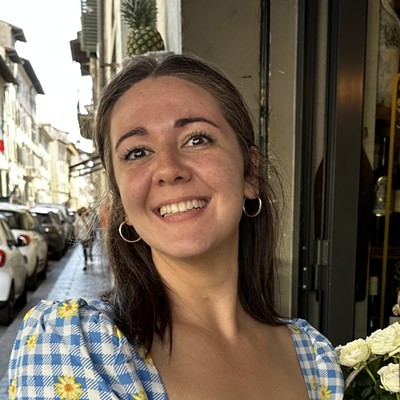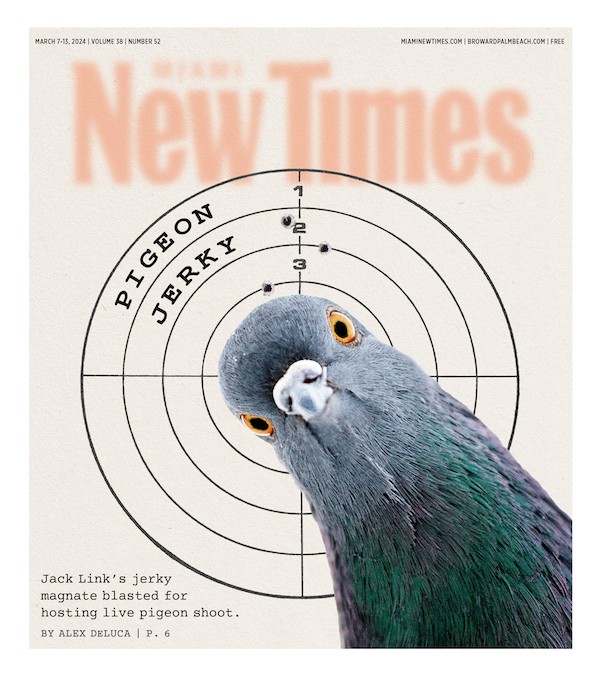Cruz steps away and sits back down on a chair right in the center of the space. He leans forward, resting his elbows on his knees. His eyes dart between all the characters on the stage, but he pays extra attention to what Salgado does next.
The Pulitzer Prize-winning author is rehearsing his play, Two Sisters and a Piano, which is set to open at the Colony Theater on January 25. This will be the second production Cruz has directed for Miami New Drama, fresh off the success of the company's 2023 production of Anna in the Tropics.
The four actors are in the early phases of rehearsal, running through the performance in a bare concrete space a few blocks from the Lincoln Road theater. The room contains a few tables and chairs. A rack of costumes stands tucked in the back corner. In the center, blocked off by pink tape, is what the actors use as their stage. Stacks of weathered scripts are scattered throughout.
Thais Menendez and Stephanie Machado, who play the titular two sisters, Maria Celia and Sofia, emerge onto the scene. Their shoes clickety-clack with each forceful step. As the two women and the young Salgado rehearse the scene with Cruz, Maurice Compte, who plays Lieutenant Portundo, takes a break on a nearby couch.
The actor rests his right arm on the sofa and cradles his head in the palm of his left hand. Behind him is a cardboard cutout of the Statue of Liberty.
Compte is well-versed in the plight of the Cuban people, ranging from his personal experience to various roles he's played on television and stage. When he was cast in the role of Portundo, it was yet another opportunity to shed light on the Cuban immigrant story.
Raised in Miami, Compte has had many full-circle moments throughout his career that bring him back to his hometown. His casting in Two Sisters is yet another special moment for the Cuban-American actor.
Compte's upbringing is so unique and oh-so-Miami that Amazon is making a series about his father's life running the famous Mutiny club from the 1980s cocaine fame. Actor Danny Pino plays the role of Compte's father, Roman, in the forthcoming series Hotel Cocaine.
"The first time I ever saw [Pino] perform was at the Colony Theater," says Compte. Pino was performing in Romeo and Juliet as a young Compte sat in the audience. At that moment, he said to himself, "One day, I'd love to come back here and do a play and be the lead."
Years later, "Here I am, and this is happening."
In Two Sisters, Compte plays Lieutenant Portundo. Mysteriously, he describes his character as someone who "wakes up at one point and doesn't like what he sees.""I love revisiting this play, especially in the state of Florida with the censoring of books and literature."
tweet this
Throughout the play, Portundo struggles with his newfound desires and lifelong conditioning of how things should and shouldn't be.
"The storyline lends itself to many different types of interpretations, many different perspectives," Compte adds. "What's even more relatable is the underlying sense that [Cruz] conveys to an audience, where you're trying to balance your inner and outer life."
Much like the character he plays on stage, Compte continues, "You're trying to harmonize those two things and also just create a sense of belonging in the world, in a world that you feel is sort of edging you out. I understand that feeling. I think that is truly the immigrant story."
The play follows two sisters, novelist Maria Celia (Menendez) and pianist Sofia (Machado), who are under house arrest. The lieutenant assigned to their case, Portundo, begins to form an infatuation with one of the sisters. What ensues is a tale that shows the power of art and the power of the unwavering human spirit.
"I love revisiting this play," Cruz tells New Times. "Especially in the state of Florida with everything that is happening, with the censoring of books and literature, and this plays very much about that."
"It's about a woman and a group of artists who wanted changes within the system. They wrote a manifesto, and as a result, a group of brigadiers came into Maria Celia's house and forced her to eat her manifesto."
Cruz was first inspired to write the story of two sisters under house arrest after learning about the real-life imprisonment of Cuban poet Maria Elena Cruz Varela. The poet was arrested for speaking out against the Cuban government and was sentenced to house arrest from 1991 until 1993. While a 38-year-old Cruz feverishly researched the story of Cruz Varela, he also began to think of the power of the imagination, literature, and art.
Two Sisters and a Piano first premiered in 1998. Years later, Cruz would go on to write Anna in the Tropics, another story about love and the power of the written word that would earn the writer a Pulitzer Prize for Drama in 2003.
"More than anything, [through Two Sisters and Anna in the Tropics] I just wanted to shed light on the whole political situation and how oppression has changed the lives of Cuban people," the playwright says. "I think it's important to document history through theater."
Theater is not only a way for artists to preserve and process the past, but it's also a way that we can get to know each other. "When I go to the theater and see a play by someone else, I get to know my neighbor," Cruz says plainly.
Two Sisters and a Piano. Thursday, January 25, through February 18, at the Colony Theater, 1040 Lincoln Rd., Miami Beach; 305-674-1040; miaminewdrama.org. Ticket costs $46.50 to $76.50. Performances happen Thursday through Saturday 8 p.m. and Sunday 3 p.m.











